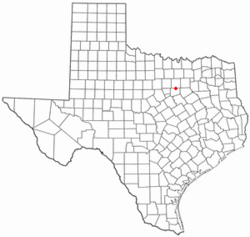Burleson, TX
| Burleson, Texas | ||
|---|---|---|
| City | ||
|
||
 Location of Burleson, Texas |
||
 |
||
| Country |
|
|
| State |
|
|
| Counties | Johnson, Tarrant | |
| Government | ||
| • Type | Council-Manager | |
| • City Council |
Mayor Ken Shetter Stuart Gillaspie Rick Green Jerry Allen Matt Aiken Dan McClendon Ronnie Johnson |
|
| • City Manager | Dale Cheatham | |
| Area | ||
| • Total | 26.1 sq mi (67.5 km2) | |
| Elevation | 712 ft (217 m) | |
| Population (2013) | ||
| • Total | 40,714 | |
| Time zone | Central (CST) | |
| • Summer (DST) | CDT (UTC) | |
| ZIP codes | 76028, 76097, 76058, 76031 | |
| Area code(s) | 817 | |
| FIPS code | 48-11428 | |
| GNIS feature ID | 1331683 | |
| Website | BurlesonTX.com | |
Burleson (/ˈbɜːrlᵻsən/ BUR-li-sən) is a city in Johnson and Tarrant counties in the U.S. state of Texas. It is also a suburb of Fort Worth.
The Missouri-Kansas-Texas Railroad, known as "the Katy", decided to extend its service from Denison to Waco. In 1881 the segment from Fort Worth to Alvarado was being laid out, and a midway depot was needed. Grenville M. Dodge, representing the railroad, purchased land for the depot and a town surrounding it from Rev. Henry C. Renfro at the site of what is now called "Old Town" Burleson. As part of the agreement, Renfro named the town Burleson, in honor of his teacher Rufus Columbus Burleson, the president of Baylor University. The first lot was sold on October 10, 1881, the date now considered to be the "founding day" of the city.
The Burleson Post Office opened in 1882, inside a retail establishment, as was common for small towns at the time. On February 20, 1895, a fire burned down most of the business district, along with several homes. One of the Katy workers, J. C. Jones, had stayed in Burleson and opened a water works for the town, drilling a deep well that provided dozens of hydrants for the residents, but they were not sufficient for extinguishing the fire. By the end of the 1800s, Burleson was an ongoing rural town, with farms all around, schools, a grocery store, cotton gins and grist mills, a general store, a druggist, a bank, even a jeweler. In 1899, a group of nine women formed a society for cultural advancement, and called it the Eumathian Club. The women acquired books, loaned them, and held readings, discussions, and music recitals. The Eumathian Club celebrated its centennial in 1999, has many notable accomplishments in its history, and is still active in Burleson to this day.
...
Wikipedia

